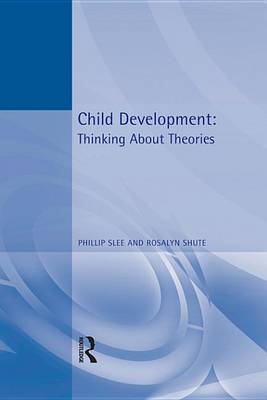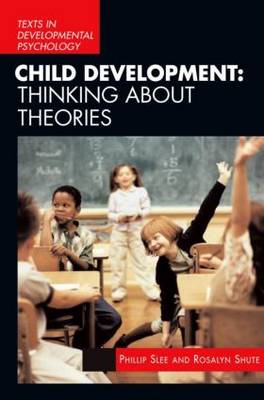International Texts in Developmental Psychology
3 total works
Child Development: Thinking About Theories
by Phillip T. Slee and Rosalyn Shute
Many areas of developmental psychology have witnessed much important research in recent years, challenging old assumptions and bringing new findings and perspectives to light. The Texts in Developmental Psychology series has been designed to embrace the emergence of new areas and developments in the field from a global perspective, providing state-of-the-art, higher level introductions to major topic areas. Each volume is written by specialists who combine empirical data and a synthesis of recent research to deliver cutting-edge science in a format accessible to students and researchers alike.
Child Development: Thinking About Theories is one of the few texts to critically examine both modern and postmodern contributions to theoretical development in child and adolescent psychology. The text has been written specifically taking into account the findings from a focus group of Honours psychology students to include pedagogical features such as an overview of theories linking the various schools of thought, ideas for further study and links to selected websites; as well as the latest developments in theoretical thinking including evolutionary theory, feminism and indigenous theory, and implications of theory for practice. Drawing from a worldwide background of research, the text is unique in that it contains many examples from Australia and other Pacific nations.
This clear and concisely written text by two university lecturers in the field of child and adolescent psychology will prove a valuable resource for advanced undergraduate/Honours students of psychology and other closely related disciplines.
Child Development
by Roslayn Shute, Philip Slee, Rosalyn H Shute, and Phillip T. Slee
Child Development: Theories and Critical Perspectives provides an engaging and perceptive overview of both well-established and recent theories in child and adolescent psychology. This unique summary of traditional scientific perspectives alongside critical post-modern thinking will provide readers with a sense of the historical development of different schools of thought. The authors also place theories of child development in philosophical and cultural contexts, explore links between them, and consider the implications of theory for practice in the light of the latest thinking and developments in implementation and translational science.
Early chapters cover mainstream theories such as those of Piaget, Skinner, Freud, Maccoby and Vygotsky, whilst later chapters present interesting lesser-known theorists such as Sergei Rubinstein, and more recent influential theorists such as Esther Thelen. The book also addresses lifespan perspectives and systems theory, and describes the latest thinking in areas ranging from evolutionary theory and epigenetics, to feminism, the voice of the child and Indigenous theories.
The new edition of Child Development has been extensively revised to include considerable recent advances in the field. As with the previous edition, the book has been written with the student in mind, and includes a number of useful pedagogical features including further reading, discussion questions, activities, and websites of interest.
Child Development: Theories and Critical Perspectives will be essential reading for students on advanced courses in developmental psychology, education, social work and social policy, and the lucid style will also make it accessible to readers with little or no background in psychology.
Child Development: Thinking About Theories
by Phillip T. Slee and Rosalyn Shute
Child Development: Thinking About Theories is one of the few texts to critically examine both modern and postmodern contributions to theoretical development in child and adolescent psychology. The text has been written specifically taking into account the findings from a focus group of Honours psychology students to include pedagogical features such as an overview of theories linking the various schools of thought, ideas for further study and links to selected websites; as well as the latest developments in theoretical thinking including evolutionary theory, feminism and indigenous theory, and implications of theory for practice. Drawing from a worldwide background of research, the text is unique in that it contains many examples from Australia and other Pacific nations.
This clear and concisely written text by two university lecturers in the field of child and adolescent psychology will prove a valuable resource for advanced undergraduate/Honours students of psychology and other closely related disciplines.


